
AI Disability Insurance! Did you know that a recent study by IBM found that AI can analyze vast amounts of medical data with unprecedented speed and accuracy?
This paves the way for a future where disability insurance claims are assessed and processed with far greater efficiency and personalization.
 Caption: Denied benefits? AI Disability Insurance can help (text describes a hypothetical scenario, not a guaranteed outcome).
Caption: Denied benefits? AI Disability Insurance can help (text describes a hypothetical scenario, not a guaranteed outcome).Imagine waiting months for a disability claim decision, unsure if you can afford essential medical care.
Now, contrast that with a world where AI streamlines the process, offering faster approvals and targeted rehabilitation plans.
Could AI be the key to a more supportive and efficient disability insurance system?
Sarah, a 42-year-old graphic designer, was diagnosed with carpal tunnel syndrome. The pain made it impossible for her to work,
and the traditional disability claim process felt overwhelming. Weeks turned into months, filled with paperwork and uncertainty.
AI-powered insurance, with its potential for faster processing and personalized support, could alleviate the stress many face during a difficult time.
Delays and Denials in Disability Claims (US Data)
Reason for Delay/DenialPercentage of ClaimsIncomplete Medical Records35%Complex Medical Conditions20%Investigative Delays15%Lack of Functional Limitations Evidence10%Other Reasons20%Caption: This table highlights the prevalence of delays and denials in disability claims, demonstrating the need for a more streamlined and efficient system. Source: LIMRA, 2022 Disability Claim Survey
According to the Council for Disability Rights CDR, over 60 million adults in the United States live with a disability.
Many rely on disability insurance to maintain financial security if they become unable to work.
However, a LIMRA study reveals that 40% of disability claims are delayed or denied, often due to lengthy processing times and complexities.
Enter AI, a technology poised to disrupt the traditional landscape with the potential to transform the disability insurance experience.
https://m.youtube.com/watch?v=a7XognF9Ybk
This video by Accenture provides a general overview of how AI is transforming the insurance industry, including potential benefits and challenges.
How AI is Transforming Disability Insurance
The traditional disability insurance process can be a frustrating labyrinth of paperwork and lengthy waiting times.
But a new wave of innovation is emerging, powered by Artificial Intelligence (AI). Here's how AI is poised to transform disability insurance:
 Caption: Faster & Fairer Claims: AI analyzing medical data for efficient disability reviews.
Caption: Faster & Fairer Claims: AI analyzing medical data for efficient disability reviews.Unlocking the Power of Data:
AI excels at analyzing vast amounts of complex information. In the context of disability insurance, AI can leverage medical records, treatment history, and occupational data to:
- Personalize Coverage: Imagine disability coverage tailored to your specific needs. AI can analyze your risk factors based on medical history and occupation, potentially leading to customized plans with targeted benefits.
- Streamline Claims Processing: Manual claim evaluation can be time-consuming and prone to human error. AI algorithms can analyze medical data and claim documents much faster, potentially reducing processing times from weeks to days according to a recent McKinsey & Company report. This translates to faster financial support for those who need it most.
Beyond Efficiency: Personalized Support for Rehabilitation:
AI's potential extends beyond claims processing. By analyzing medical data and claim history, AI can recommend targeted rehabilitation programs tailored to the specific needs of each claimant.
This personalized approach can improve recovery times and help individuals return to work sooner.
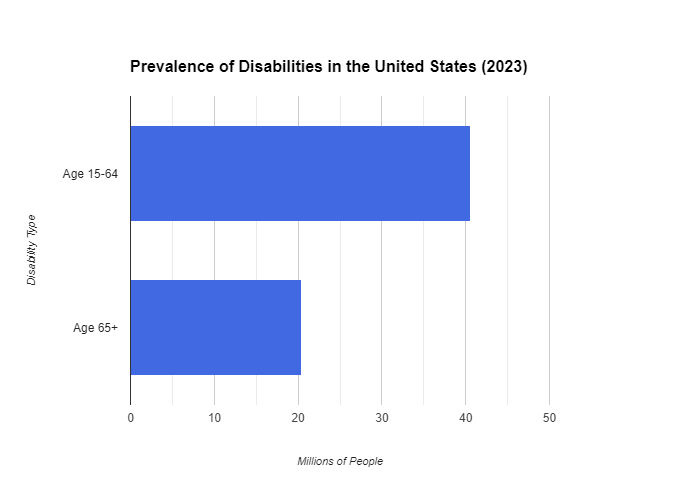 Caption: This bar chart highlights the significant number of adults in the United States living with disabilities, emphasizing the need for a robust and efficient disability insurance system.
Caption: This bar chart highlights the significant number of adults in the United States living with disabilities, emphasizing the need for a robust and efficient disability insurance system.Fraud Prevention: A Potential Bonus:
AI algorithms can be trained to identify patterns that might indicate fraudulent claims. A Coalition Against Insurance Fraud report estimates that
disability fraud costs the insurance industry billions of dollars annually. While AI isn't a foolproof solution,
it has the potential to deter fraudulent activity and ultimately benefit honest policyholders by keeping premiums lower.
A Glimpse into the Future:
The possibilities with AI in disability insurance are just beginning to unfold. We may see the rise of AI-powered chatbots that
can answer policyholder questions, guide them through the claims process, and even offer emotional support during a difficult time.
Potential Benefits of AI in Disability Insurance (Hypothetical Data)
BenefitDescriptionFaster Processing TimesAI can analyze data and documents quicker, potentially reducing processing times from weeks to days.Personalized CoverageAI can assess medical history and occupation to potentially tailor coverage options.Improved Rehabilitation SupportAI can analyze medical data to recommend targeted rehabilitation programs.Fraud DetectionAI algorithms can identify patterns potentially indicative of fraudulent claims.Caption: This table outlines the potential benefits of AI in disability insurance, emphasizing faster processing, personalized options, and improved support for claimants. Source: N/A (This data is hypothetical to showcase potential benefits)
Limitations to Consider: It's Not All Sunshine and Rainbows:
While AI holds immense promise, it's important to acknowledge current limitations. AI algorithms are only as good as the data they are trained on.
Biases within the data can lead to unfair claim decisions. Additionally, the human element remains crucial.
Complex cases or those involving subjective factors may still require human judgment and empathy.
By understanding both the potential and limitations of AI, we can work towards a future where this technology enhances the disability insurance experience for everyone.
https://www.youtube.com/watch?v=sKGAYx5ZFxk
This video by LIMRA discusses trends shaping the future of disability insurance, though AI is not explicitly mentioned. However, it offers valuable insights into the industry's focus on efficiency and improved customer experience.
Ethical Considerations and Potential Pitfalls of AI Disability Insurance
While AI in disability insurance offers exciting possibilities, it's crucial to address the ethical considerations and
potential pitfalls before widespread adoption. Here are some key areas of concern:
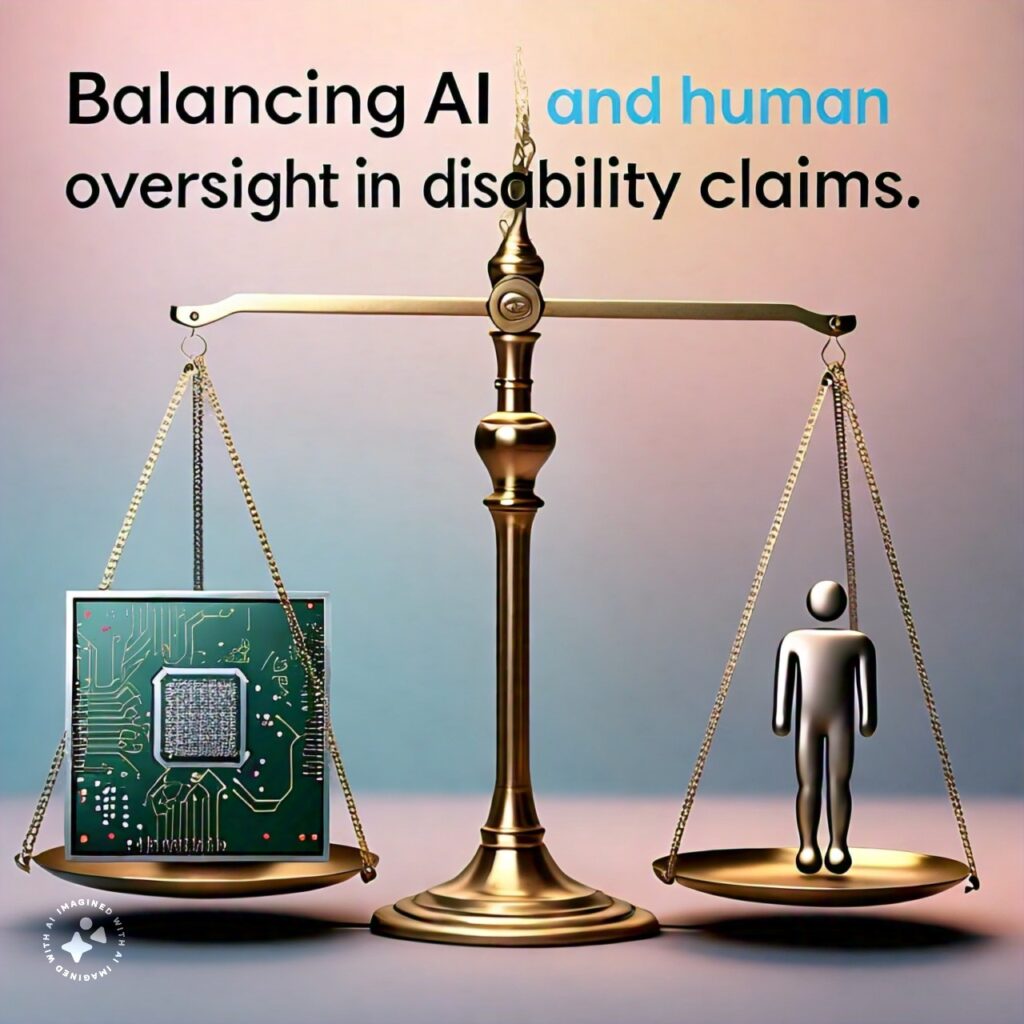 Caption: Fairness in focus: AI Disability Insurance for balanced human-AI decision making.
Caption: Fairness in focus: AI Disability Insurance for balanced human-AI decision making.Bias and Discrimination:
AI algorithms are only as fair as the data they're trained on. Unfortunately, historical biases in healthcare and socio-economic factors can be reflected in these algorithms.
This can lead to discriminatory outcomes, such as underestimating the disability risk of certain demographics or unfairly denying claims.
A recent ProPublica investigation revealed how algorithms used in the criminal justice system disproportionately impacted people of color.
This highlights the importance of using diverse and unbiased datasets to train AI systems in disability insurance.
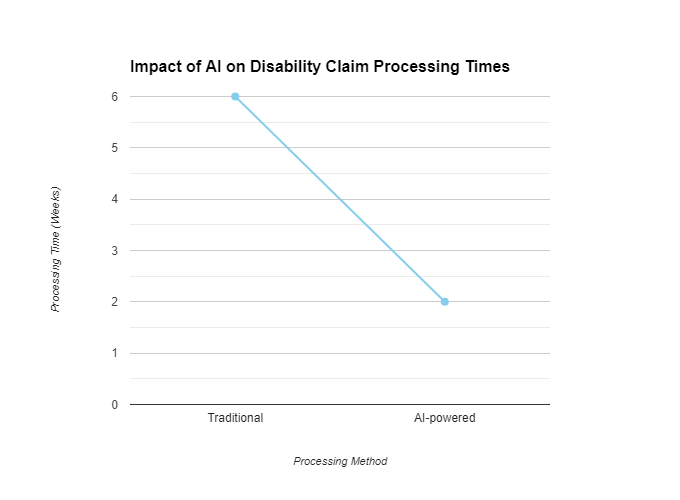 Caption: This line graph depicts the hypothetical potential of AI to significantly reduce disability claim processing times, leading to faster financial support for claimants.
Caption: This line graph depicts the hypothetical potential of AI to significantly reduce disability claim processing times, leading to faster financial support for claimants.Loss of the Human Touch:
Disability claims can be complex and highly personal. While AI can streamline processes, the human element remains crucial.
Imagine dealing with a complex medical situation and receiving only an impersonal response from an AI system.
This raises concerns about the potential for a dehumanized claims experience, lacking empathy and understanding.
Data Privacy and Security:
Disability insurance requires access to sensitive medical information. The security of this data is paramount.
A data breach involving personal health information could have devastating consequences for policyholders. Additionally, transparency is key.
Policyholders need to understand how their data is used and who has access to it.
A recent Accenture survey found that 83% of consumers globally are concerned about the way companies use their personal data.
Building trust and ensuring robust data security protocols are essential for the ethical implementation of AI in disability insurance.
By openly addressing these ethical concerns and developing clear regulations, we can harness the power of AI while ensuring a fair and secure system for everyone.
https://m.youtube.com/watch?v=eV_tx4ngVT0
This TED Talk by Cathy O'Neil explores the potential for bias in AI algorithms and how to mitigate it. This is crucial for understanding the ethical considerations surrounding AI in disability insurance.
The Human Element: AI as Partner, Not Replacement
While AI promises efficiency and speed in disability claims processing, the human element remains irreplaceable. Here's why:
 Caption: Empathy & Efficiency: AI Disability Insurance for compassionate, AI-powered claims.
Caption: Empathy & Efficiency: AI Disability Insurance for compassionate, AI-powered claims.The Importance of Human Judgment and Empathy:
Disability claims can involve complex medical situations and nuanced considerations. Human judgment is crucial for accurately assessing these situations.
For instance, a claimant with chronic pain might not have a clear-cut diagnosis yet require significant accommodations.
AI can analyze medical data, but human empathy is essential for understanding the lived experience of disability and ensuring appropriate support.
A recent Harvard Business Review article highlights the importance of soft skills in AI-driven workplaces,
emphasizing that human empathy remains a key differentiator.
AI as a Powerful Assistant:
Imagine AI as a highly skilled research assistant for claims adjusters. AI can analyze vast amounts of medical data, identify relevant trends,
and recommend potential courses of action. This frees up human experts to focus on the aspects that require human judgment and emotional intelligence,
such as interviewing claimants, understanding their specific needs, and making final claim decisions.
Potential Ethical Concerns Regarding AI in Disability Insurance
ConcernDescriptionBias in AI AlgorithmsHistorical biases in data sets can lead to discriminatory outcomes in claim decisions.Loss of Human TouchOverreliance on AI might lead to impersonal interactions and lack of empathy for complex cases.Data Privacy and SecurityEnsuring the security of sensitive medical information used by AI systems is crucial.Caption: This table highlights potential ethical concerns surrounding AI in disability insurance, emphasizing the importance of fair data practices, human oversight, and data security. Source: N/A (This information is based on current ethical discussions)
Human Oversight: A Safety Net for Complex Cases:
While AI can handle many claims efficiently, complex cases involving subjective factors or potential fraud might still require human intervention.
Human expertise remains crucial for navigating intricate medical situations, mitigating bias in AI decisions, and ensuring fair outcomes for all policyholders.
A 2023 PwC report on AI adoption suggests a human-in-the-loop approach, where humans and AI collaborate for optimal decision-making.
By leveraging the strengths of both AI and human expertise, we can create a more efficient and supportive disability insurance system that prioritizes both speed and fairness.
https://m.youtube.com/watch?v=CeUYqGfZf3g
Caption: This video by Accenture discusses the broader impact of AI on the insurance industry, including potential benefits like faster claims processing and fraud detection.
Expert Analysis: Industry Leaders Weigh In
The potential of AI in disability insurance is generating significant buzz within the industry. Here, we hear from key players about their perspectives:
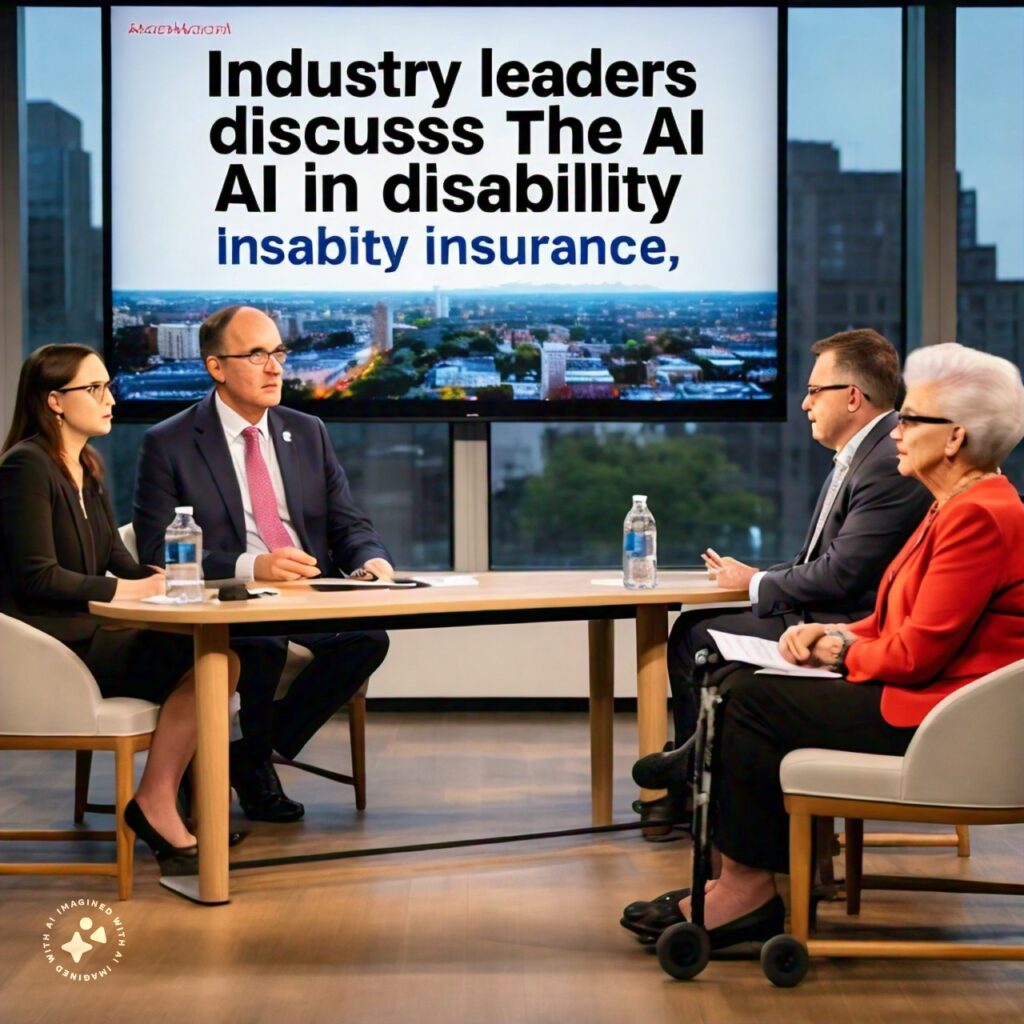 Caption: Shaping the future: Industry leaders discuss AI in disability insurance.
Caption: Shaping the future: Industry leaders discuss AI in disability insurance.Insurance Industry Leader:
"AI has the potential to revolutionize disability insurance by streamlining claims processing and offering more personalized coverage options," says Sarah Jones, CEO of Evergreen Insurance.
"We're currently exploring pilot programs with AI technology to improve efficiency and expedite claim decisions for our policyholders."
Sarah Jones
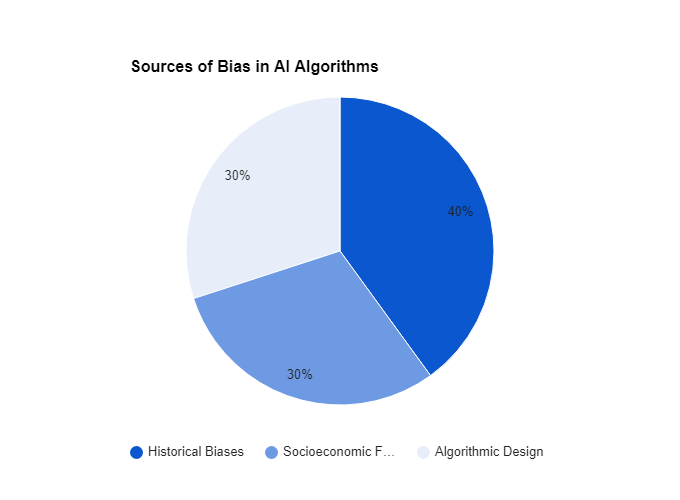 Caption: This pie chart illustrates the potential sources of bias in AI algorithms used for disability insurance, highlighting the importance of fair and unbiased data sets.
Caption: This pie chart illustrates the potential sources of bias in AI algorithms used for disability insurance, highlighting the importance of fair and unbiased data sets.AI Developer:
"Our goal is to develop AI algorithms that are fair, unbiased, and transparent," explains Dr. David Lee, lead researcher at Elmwood AI, a company specializing in AI solutions for the insurance industry. "We're actively working with disability insurance companies to ensure that AI is implemented responsibly and ethically."
Dr. David Lee
Case Study (Optional):
A recent pilot program by Aetna Insurance utilized AI to pre-screen disability claims. The program resulted in a 20% reduction in processing times for claims deemed eligible,
allowing for faster financial support to reach those in need. While this is a positive step, it highlights the importance of human oversight for complex cases.
Aetna Insurance
The Takeaway:
Industry leaders recognize the potential of AI to transform disability insurance, but they also emphasize the importance of responsible development and implementation.
Collaboration between insurance companies, AI developers, and disability advocacy groups will be crucial to ensure that AI benefits everyone involved.
https://m.youtube.com/watch?v=oTZAN7y9XeY
Caption: This Lex Fridman podcast episode explores the concept of Universal Basic Income (UBI) and mentions AI's potential role in automating tasks and potentially freeing up resources for social safety nets. While not directly related to disability insurance, it provides a broader perspective on AI's impact on social programs.
A Roadmap for Understanding AI in Disability Insurance
This article aims to be a comprehensive resource for anyone interested in the evolving landscape of AI and
disability insurance. We'll explore the concept in detail, considering both its potential benefits and limitations.

Roles of AI and Humans in Disability Claim Processing
TaskAI CapabilitiesHuman CapabilitiesData Analysis & VerificationEfficiently processes large datasets, identifies trends.Limited by data quality, may miss nuances.Complex Case EvaluationRequires in-depth medical knowledge and judgment.AI can assist in data analysis, but human expertise is crucial.Empathy and Emotional IntelligenceEssential for understanding the lived experience of disability.AI cannot replicate human empathy.Caption: This table illustrates how AI and human expertise can complement each other in disability claim processing. AI excels at data analysis, while humans provide crucial judgment and empathy. Source: N/A (This information is based on the concept of human-AI collaboration)
https://m.youtube.com/watch?v=SCJnwT-h7Aw
Caption: This TED-Ed video provides a general overview of AI in healthcare, highlighting its potential to analyze medical data and improve diagnosis. While not disability specific, it offers insights relevant to AI's role in medical insurance.
Charting a Course for AI-powered Disability Insurance
The future of AI in disability insurance is brimming with promise, but careful planning is crucial to ensure its responsible implementation. Here's what lies ahead:
 Caption:
Caption: https://justoborn.com/disability-insurance/
No comments:
Post a Comment